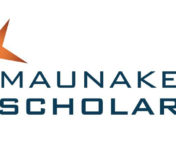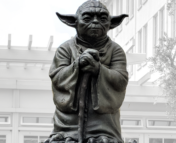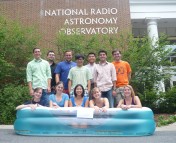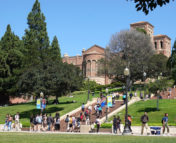As graduate students in astronomy progress through their degree-granting programs, they evolve from students into teachers, mentees into collaborators, and occasionally from advisees into advisors. Taking on a younger student to advise them on a research project may seem difficult, stressful, or daunting, and that’s because it can be. But it can also be an incredibly enriching, exciting, and fun experience for you and your student. Advising students, to many, is one of the most rewarding aspects of doing research, but it’s one that many graduate students may not experience over the course of their Ph.D., in part because it can appear so intimidating.
I won’t claim to be a great expert on the subject, but this summer I advised my first undergraduate researcher on a project, and my hope is that this Astrobite can serve as an encouragement to others who might be interested in taking on that kind of responsibility during their Ph.D.
Your opportunity to advise a research student varies dramatically depending on your employing institution, research group, and funding situation. You might work in a large lab, where older graduate students are expected to supervise younger graduate students; you might be your advisor’s only student; you yourself might be funded through a teaching assistantship, a large grant, a fellowship, or a variety of these; your institution might have money set aside for PIs to take on undergraduate summer students. The point is, most student projects aside from undergraduate theses or unpaid internships require funding in order to compensate the researcher for their work, and often the source of this funding is beyond your capacity to influence.
In my case, I was awarded a small grant as the PI of an observing proposal, which was enough to cover an undergraduate’s summer stipend. The conceptual work for the project was fairly straightforward in that case, since the funding was tied to specific observations I had proposed. I already knew what I wanted the project to accomplish, and the student would work towards that goal. I think having a well-defined scope for a student project is key to the student’s success. More open-ended projects can work, but early-career researchers struggle with setting goals and determining end states for their projects (at least, I know I did), so having the start and end of a project in mind beforehand can help you guide the student through the difficult bits.
Once you have a source of funding and an appropriate research project in mind, finding your student is the next step. In many instances, you might have a pool of applicants from a larger Research Experience for Undergraduates (REU) or internship program at your institution, or your advisor might have picked someone out for you. In my case, I had neither. I mentioned my project idea to an undergraduate who I was teaching to use our campus telescope, and they reached out to me expressing interest in the project afterwards. You might have to write up a brief description of your project for a department webpage or email that is shared with prospective students. Wherever possible, you should be upfront with prospective advisees about the scope and topic of your project, but also the research environment, pay, and expectations of the position.
The most difficult part of the process I found was ensuring the logistics of the project pan out. For example, you’re now (at least partially) responsible for organizing the stipend payment through the correct administrative channels, getting the student an office or space to work, ensuring they have keys and are on the right email-lists. Universities are generally inefficient and notoriously bad at paying people on time (see, e.g. this article, discussion on this forum post, or the demands this graduate workers union are making), and the burden of that inefficiency always falls on the most vulnerable employees. Be especially mindful of these issues before your student starts. In my case, I began bugging administrators and higher ups more than a month early to get my students summer paycheck set up, but still nearly had trouble getting my student their first week’s pay on time.
The first week of your student’s project is the most important. You’ll want to set expectations clearly and appropriately. Do you (or your lab, your building, etc) expect the student to work specific hours in the day or week? Are there important meetings, journal clubs, or hack-sessions you want the student to regularly attend? At a minimum, you should expect to meet regularly with your student weekly, in order to check up on them: now’s the time to schedule when this meeting happens and how often. I found a mixture of flexibility and accountability worked well for me and my student. We planned to meet at a regular time at least once a week, set expectations about how and when we would be available for contact (Do you check your emails or messages at a specific time? Do you leave your computer at work?), and we established a handful of other meetings and journal clubs we planned to attend. We also talked through what we expected from the project itself. I told my student what kind of result I expected to learn from the data, but was sure to establish that the data itself was difficult to work with, and that a null result was a perfectly acceptable outcome of the project.
If the first week is the most important, the middle of a project is usually the most difficult. I tend to get bogged down in the details of my projects, to lose sight of the project’s broader goals or expectations, or to get stuck on a particular problem for a while. Even if your student is an exceptional problem solver (like mine was), it’s natural for anyone to feel stuck or frustrated during the course of research. The moment when this happens is when you can have the most impact as an advisor, and your response to a student’s frustrations or concerns can define their success. I found it was helpful to remind myself how much reassurance I wished I had at their career stage, and then give maybe a little more than I thought appropriate. I think reassurance is like pizza: it’s usually not possible to have too much, but it is very possible to have too little; when delivering it, erring on the side of too much can avoid trouble. When reassuring your advisee, it was helpful for me to draw from my own experiences for examples of times I was similarly lost or confused.
In the end, not all projects are created equally. No matter what kind of progress your student makes, semesters or summers or grants all run out eventually. It’s important to determine end-points for your student’s project, potentially multiple end-points so that they can make informed decisions that are best for them. In my case, I made it clear to my student that they could pivot their project towards another topic at the summer’s halfway point. If they stuck with the original topic, I hoped for a specific deliverable by the end of summer (in our case, a completed orbit fit to a challenging radial velocity dataset), and gave them options for continuing the project later on in order to publish their result.
This past week, I had brunch with my student before they traveled back home for the remainder of the summer. The last two months they’ve consistently impressed me with their insights, perseverance, and organization. I can’t claim credit for their skill, and I certainly don’t think I was a perfect advisor (it was a tough summer for me) but I am so excited to continue to collaborate with them and was honored to advise them on their project. It was one of the most fulfilling experiences of my Ph.D. so far, and I hope that other astronomy graduate students can find similar fulfillment during their appointments.
Astrobite edited by William Lamb
Featured image credit: User Halfblue on en.wikipedia via Creative Commons Attribution-Share Alike 3.0 Unported




